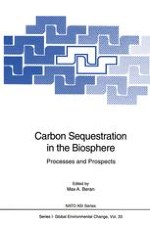1995 | OriginalPaper | Chapter
Carbon Sequestration in Marine Systems
Author : P. M. Holligan
Published in: Carbon Sequestration in the Biosphere
Publisher: Springer Berlin Heidelberg
Included in: Professional Book Archive
Activate our intelligent search to find suitable subject content or patents.
Select sections of text to find matching patents with Artificial Intelligence. powered by
Select sections of text to find additional relevant content using AI-assisted search. powered by
Biological processes in the oceans that affect the partitioning of CO2 between the atmosphere and oceans under different conditions of global climate and sea level are briefly described. For the oceans, the present net uptake due to organic productivity is small and any alteration of this balanced condition is likely to be very gradual. By contrast, the coastal zone, which tends to be a net source of CO2 to the atmosphere due to the oxidation of organic matter transported from the land, exhibits several potential mechanisms for the sequestration of anthropogenic CO2 involving ecological and geochemical processes. However, this region is being significantly altered by humans as a result of modifications to catchment systems and the land-ocean interface and, indirectly, to climate and sea level. A qualitative analysis suggests that the capacity of the coastal zone to store organic carbon will become weaker as ecosystems are disturbed and as organic material is mobilised and oxidised within catchment sytems and coastal environments. In both the open ocean and shelf seas changes to the carbonate system could also affect levels of atmospheric CO2 but the rate at which these might occur and their net effect are uncertain.
